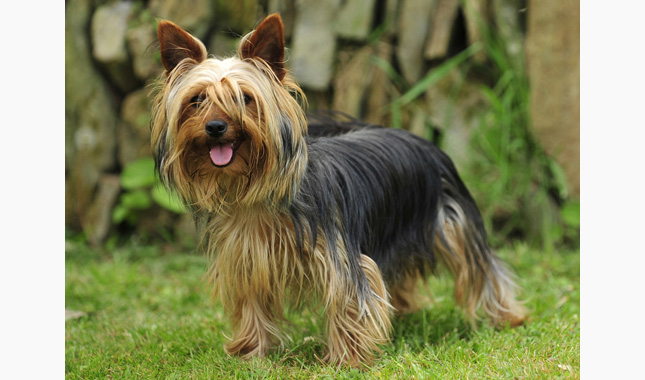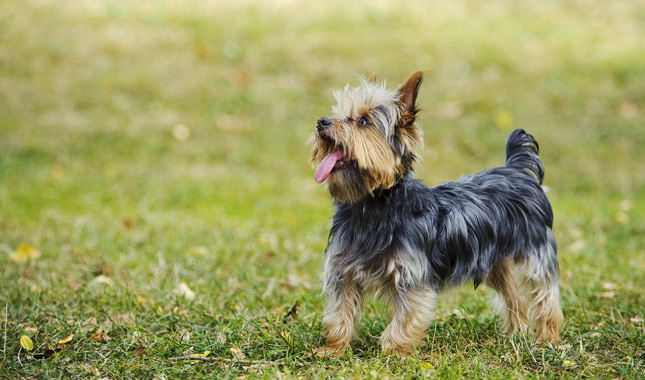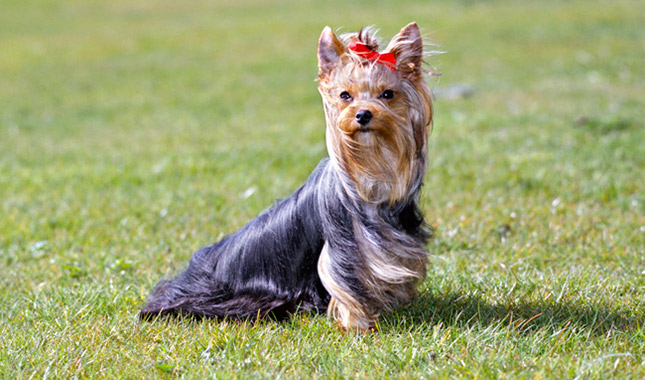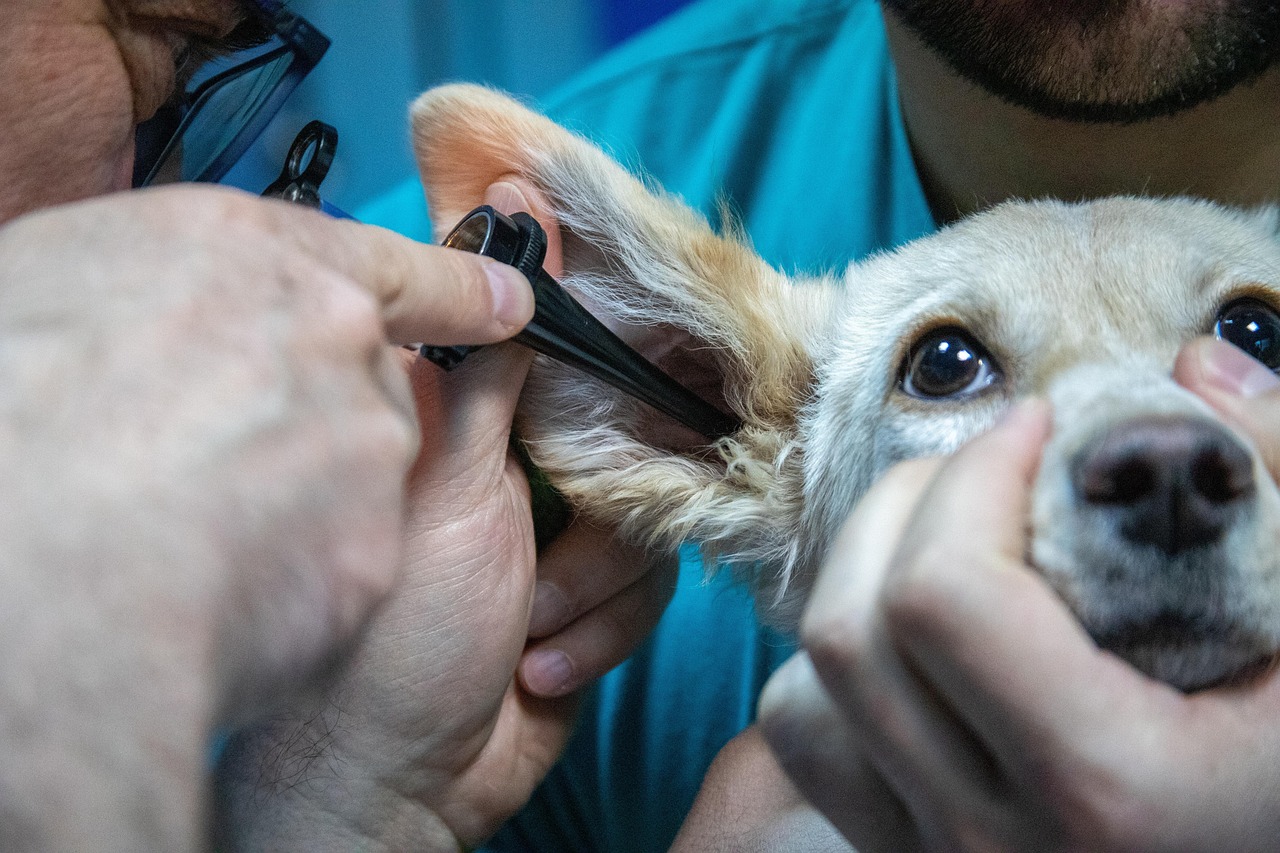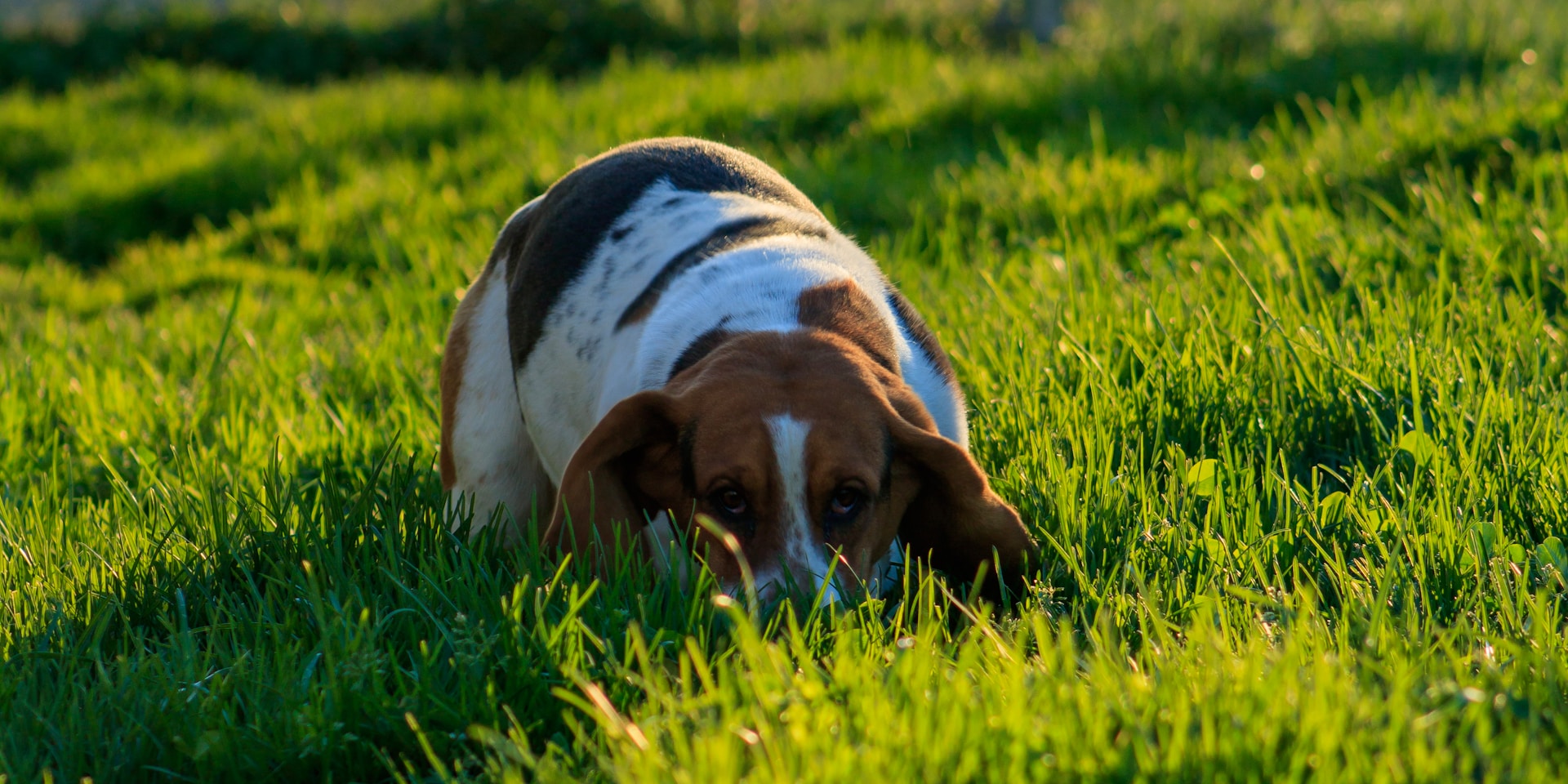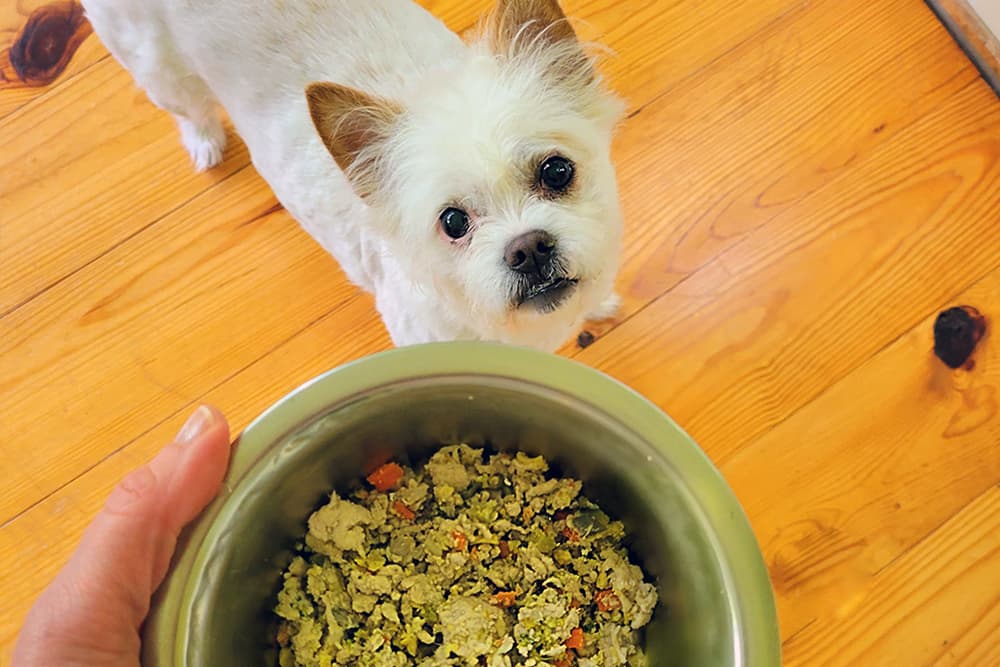Yorkshire Terrier
Updated on August 14, 2024
Breed Details
- Height: 8 to 9 inches at the shoulder
- Weight: 4 to 7 pounds, sometimes larger
Breed Characteristics
Adaptability
Trainability
Grooming
Apartament Friendly
Child Friendly
Shedding Level
Dog Friendly
Exercise Needs
Territorial
Barking Tendencies
Health Issues
Social Needs
Energy Level
Affectionate
Watchdog Instincts
Cat Friendly
Intelligence
Stranger Friendly
This little guy may be classified as a Toy dog, but his personality is pure terrier. Spunky and smart, he loves to play, gets along well with cats, and has the ability to rule bigger family dogs with an iron paw. The breed comes with one caveat: His beautiful coat is high maintenance, even if clipped short. Taming those tresses can require some TLC and patience. But you can also look for breed-specific dog food options specifically formulated to promote Yorkie coat health, like Royal Canin’s Breed Health Nutrition Dog Food for Yorkshire Terriers.
Yorkshire Terriers have long been labeled as the preferred companions of well-heeled, older women who wouldn’t deign to live in a building without a doorman, and who can’t bear to be late for the local arts fundraiser. Yet there aren’t enough society dames out there to account for the Yorkie’s popularity. Truth is, he appeals to a wide range of dog-lovers, thanks to his shoe-button eyes and soft-to-the-touch, silky coat.
The Yorkie is alert, trainable, and insatiably curious, making him a quintessential “big dog in a little dog’s body.” Typically weighing less than seven pounds, Yorkies are the darlings of the purse-dog set, but they also need ample time on the ground. He’ll happily take long walks, and he can be quite a determined — and boisterous — watchdog, as well.
His tough-minded personality aside, the Yorkie isn’t a good choice for families with small children because his own small size puts him at risk of injury. He can also be nippy with overzealous kids, aggressive with other dogs, and obstinate about house-training. Consistent and structured training is a must for the Yorkie, who needs to learn that he can’t challenge every dog that crosses his path. The other obstacle: This naturally yappy guy can never be fully silenced.
Other Quick Facts
- The Yorkshire Terrier has an inquisitive temperament — not to mention an impish sense of humor.
- Yorkies have stunning blue-and-tan coats, but they’re not born that way. Puppies are black, and their coat color develops as they mature.
- Despite their Toy status, these dogs love speed, action, and plenty of applause, so sports such as agility and rally are tailor-made for them.
- Show dogs should weigh between four to seven pounds, but pet Yorkies can weigh as much as 12 to 15 pounds. A Yorkie who weighs less than four pounds is more prone to health problems, and more likely to suffer complications while under anesthesia.
More on Vetstreet.com:
- 18 Best Breeds for New Dog Owners
- 11 Tiny Dog Breeds With Big, Bold Personalities
- 10 Most High-Maintenance Dog Breeds
- 12 Most Talkative Dog Breeds
All featured products are chosen at the discretion of the Vetstreet editorial team and do not reflect a direct endorsement by the author. However, Vetstreet may make a small affiliate commission if you click through and make a purchase.
The History of Yorkshire Terriers
The Yorkshire Terrier’s bold nature descends directly from his ancestors, which include the long-extinct Clydesdale Terrier and the Black-and-Tan Terrier. Scottish weavers who migrated south to England during tough economic times took their terriers with them to York, Manchester, and Leeds. The weavers ultimately crossbred their little terriers with local dogs, creating the small but feisty terrier known today for its shimmering cloak of blue and gold.
Yorkies proved to be fine ratters in the English woolen mills, a skill they retain to this day. As they became more and more of a companion dog, breeders began to select for smaller size. The dog considered to be the foundation sire of the modern Yorkie, Huddersfield Ben, was born in 1865. At the time, the dogs were called Broken Haired Scotch Terriers or Toy Terriers, but by 1870, they were known as Yorkshire Terriers, after the region where they were first produced. It wasn’t long before these tough ratters morphed into domestic sidekicks for fashionable ladies, and began appearing at dog shows as “fancy terriers.”
By 1872, Yorkshire Terriers had made their way to the U.S., where they quickly became upper-crust favorites and even political mascots. The Nixon family shared the White House with their beloved Yorkie, Pasha. The Yorkshire Terrier currently holds third place among the breeds registered by the American Kennel Club.
Yorkshire Terrier Temperament and Personality
Although the Yorkshire Terrier is a Toy breed, he won’t settle for a boring life. The Yorkie is smart and independent, making him a dog who is both entertaining and notoriously stubborn. Yorkies want to please — until something more interesting strikes their fancy. So if you really want a lazy lap dog, opt for another breed.
Yorkies have two distinct personalities: cuddly and mischievous. Cuddly Yorkies have a perky nature, but they tend to be more laidback. Some people say males are sweeter and more likely to enjoy snuggling, while females are more particular about when — and if — they’ll hang out in your lap.
Yorkies may be tiny, but their bravery is legendary: Smokey, a World War II hero, managed to pull 70 feet of wire through an underground tunnel. Oliver, who lived in upstate New York, saved a woman from a mauling by diverting the other dog’s attention. In fact, the breed’s fearless nature often poses a problem for owners — Yorkies aren’t shy about taking on dogs three times their size!
Most Yorkies respond well to training because they adore all the attention they receive for doing tricks and competing in agility trials. Positive praise and food rewards are key to training this breed. It’s also easy to spoil a Yorkie — he’s just as capable of learning good manners as any other dog, but people who give their puppy a pass because he’s little and cute will find that bad habits in adults are hard to break.
What You Need to Know About Yorkshire Terrier Health
Yorkshire Terrier Nutrition
One of the most important decisions a pet parent will make is what to feed their Yorkie. Support your Yorkie puppy’s nutritional needs with Royal Canin Breed Health Nutrition Yorkshire Terrier Puppy Dry Dog Food. Yorkies between 8 weeks and 10 months old will enjoy the unique kibble shape, designed with the breed’s smaller jaws in mind. The formula also contains antioxidants to help fortify your Yorkie pup’s developing immune system.
As your pup transitions to adulthood, switch to Royal Canin Breed Health Nutrition Yorkshire Terrier Breed Specific Adult Dry Dog Food at 10 months. The smaller kibble shape and size encourage them to chew, which helps reduce tartar formation. Royal Canin includes biotin and omega-3 and omega-6 fatty acids in every bite for coat support.
For Yorkies who prefer soft dog food, the Royal Canin Breed Health Nutrition Yorkshire Terrier Adult Dog Wet Food features a pate texture loaf in sauce. You can feed it on its own or with Royal Canin’s adult dry dog food for Yorkies.
Tiny dogs often come with big health problems, and the Yorkshire Terrier is no exception. Most Yorkies live long, healthy lives, but there are conditions that are common to the breed, such as weakened collapsing tracheas, luxating patellas, dental issues, hypothyroidism, and Legg-Calve-Perthes disease. Low blood sugar (hypoglycemia) is also a problem — especially in smaller Yorkies and puppies — as well as certain types of bladder stones, hair loss, cataracts, and ingrown eyelashes.
Yorkies have a high incidence of a liver defect known as portosystemic shunt, which may need to be treated with expensive surgery. If you are concerned about your dog, there is a test that can identify carriers of the disease.
The kneecaps of many small dogs, including Yorkies, can pop out of place, a defect known as luxating patellas. Ask your veterinarian to examine your dog’s knees regularly, especially if you notice him limping or hopping while running. It’s also essential that Yorkies get regular veterinary dental care. Since they have tiny mouths, they often have problems with overcrowding and improper development of the teeth.
The Yorkshire Terrier can also suffer from Legg-Calvé-Perthes disease. Dogs with this disease have reduced blood supply to the head of the rear leg bone, causing it to degrade. Signs include limping, which usually shows up by the time the dog is six months old. The disease can be treated with surgery, so the sooner the condition is identified and treated, the greater the chances are that your dog will enjoy a full recovery.
Before a Yorkshire Terrier can be included in the Canine Health Information Center (CHIC) database, the Yorkshire Terrier Club of America requires that he receive a clearance from the Canine Eye Registration Foundation (CERF) at one, three, and six years of age, as well as a patella evaluation from the Orthopedic Foundation for Animals (OFA). Optional CHIC tests for Yorkies include a Legg-Calve-Perthes evaluation; a thyroid evaluation, recommended at one, three, and six years of age; and participation in the Cornell DNA Bank and the OFA/CHIC DNA Repository. Anyone can search the OFA and CHIC websites to see if a puppy’s parents are listed.
On a daily basis, consider providing your Yorkie with a high-quality probiotic such as Great Poop. The easy-to-adminster chicken-flavored chew is packed with enzymes, fiber, probiotics, and prebiotics. Pet parents appreciate seeing regular, firm stools and Yorkies love the tasty snack each day.
Smitten with the idea of a teeny-tiny Yorkie? Sure, they are cute, but they’re also more prone to medical problems like hypoglycemia. In fact, reputable breeders discourage people from buying three-pounders because they usually lead to heartbreak.
The Basics of Yorkshire Terrier Grooming
Yorkies are definitely not low-maintenance pooches. If you keep their coats show-dog long, they need to be brushed daily, with their long topknot tied up and kept out of their eyes. Most pet-owners opt for a “puppy” clip, with the facial hair left a bit longer than the hair on the body. Regular trips to a professional groomer are a must, along with weekly baths.
On the plus side, Yorkies don’t shed much, possibly making them less problematic for some people with allergies. However, this varies from dog to dog, so don’t believe anyone who tells you that Yorkies are “non-allergenic.”
The rest is basic care: Trim his nails every week or two. (They should never get so long that you can hear them clicking on the floor.) And brush his teeth regularly with a pet toothpaste for overall health and fresh breath.
Finding a Yorkshire Terrier
Whether you want to go with a breeder or get your dog from a shelter or rescue, here are some things to keep in mind.
Choosing a Yorkshire Terrier Breeder
Selecting a respected breeder is a great way to find the right puppy. Reputable breeders will welcome questions about temperament and health clearances, as well as explain the history of the breed and what kind of puppy makes for a good pet. Don’t be shy about describing exactly what you’re looking for in a dog — breeders interact with their puppies daily and can make accurate recommendations once they know something about your lifestyle and personality.
To start your search, check out the website of the Yorkshire Terrier Club of America (YTCA) and choose a breeder who has agreed to abide by the club’s code of ethics, which specifies that members not place puppies prior to 12 weeks of age, prohibits the sale of puppies through pet stores, and calls for the breeder to obtain recommended health clearances before breeding.
Lots of breeders have websites, so how can you tell who’s good and who’s not? Red flags to look out for: multiple litters on the premises, puppies always being available, having your choice of any puppy, and being offered the option to pay online with a credit card. Breeders who sell puppies at a lower price “without papers” are unethical and should be reported to the American Kennel Club. You should also bear in mind that buying a puppy from a website that offers to ship the dog immediately can be a risky venture — it leaves you no recourse if what you get isn’t exactly what you expected.
And don’t trust a seller who tells you that a “teacup” Yorkie is more valuable or desirable. Extreme miniaturization often results in health problems and a shortened lifespan. The YTCA specifically prohibits its members from marketing puppies with terms like “teacup,” “doll-faced” or “tiny specialist.”
Whether you’re planning to get your new best friend from a breeder, a pet store, or another source, don’t forget that old adage “let the buyer beware”. Disreputable breeders and facilities that deal with puppy mills can be hard to distinguish from reliable operations. There’s no 100% guaranteed way to make sure you’ll never purchase a sick puppy, but researching the breed (so you know what to expect), checking out the facility (to identify unhealthy conditions or sick animals), and asking the right questions can reduce the chances of heading into a disastrous situation. And don’t forget to ask your veterinarian, who can often refer you to a reputable breeder, breed rescue organization, or other reliable source for healthy puppies.
The cost of a Yorkie puppy varies depending on the breeder’s locale, the sex of the puppy, the titles that the puppy’s parents have, and whether the puppy is best suited for the show ring or a pet home. Puppies should be temperament tested, vetted, dewormed, and socialized to give them a healthy, confident start in life. If you put as much effort into researching your puppy as you would when buying a new car, it will save you money in the long run.
Before you decide to buy a puppy, consider whether an adult Yorkie may better suit your lifestyle. Puppies are loads of fun, but they require a good deal of time and effort before they grow up to be the dog of your dreams. An adult may already have some training, and he’ll probably be less active, destructive, and demanding than a puppy. With an adult, you know more about what you’re getting in terms of personality and health and you can find adults through breeders or shelters. If you are interested in acquiring an older dog through breeders, ask them about purchasing a retired show dog or if they know of an adult dog who needs a new home. If you want to adopt a dog, read the advice below on how to do that.
Adopting a Dog From a Yorkshire Terrier Rescue or Shelter
There are many great options available if you want to adopt a dog from an animal shelter or breed rescue organization. Here is how to get started.
1. Use the Web
Sites like Petfinder.com and Adopt-a-Pet.com can have you searching for a Yorkie in your area in no time flat. The site allows you to be very specific in your requests (housetraining status, for example) or very general (all the Yorkies available on Petfinder across the country). AnimalShelter.org can help you find animal rescue groups in your area. Also some local newspapers have “pets looking for homes” sections you can review.
Social media is another great way to find a dog. Post on your Facebook page that you are looking for a specific breed so that your entire community can be your eyes and ears.
2. Reach Out to Local Experts
Start talking with all the pet pros in your area about your desire for a Yorkie. That includes vets, dog walkers, and groomers. When someone has to make the tough decision to give up a dog, that person will often ask her own trusted network for recommendations.
3. Talk to Breed Rescue
Most people who love Yorkies love all Yorkies. That’s why breed clubs have rescue organizations devoted to taking care of homeless dogs. The Yorkshire Terrier Club of America can help you find a dog that may be the perfect companion for your family. You can also search online for other Yorkie rescues in your area.
The great thing about breed rescue groups is that they tend to be very upfront about any health conditions the dogs may have and are a valuable resource for advice. They also often offer fostering opportunities so, with training, you could bring a Yorkie home with you to see what the experience is like.
4. Key Questions to Ask
You now know the things to discuss with a breeder, but there are also questions you should discuss with shelter or rescue group staff or volunteers before you bring home a dog. These include:
What is his energy level?
How is he around other animals?
How does he respond to shelter workers, visitors, and children?
What is his personality like?
What is his age?
Is he housetrained?
Has he ever bitten or hurt anyone that they know of?
Are there any known health issues?
Wherever you acquire your Yorkie, make sure you have a good contract with the seller, shelter or rescue group that spells out responsibilities on both sides. Petfinder offers an Adopters Bill of Rights that helps you understand what you can consider normal and appropriate when you get a dog from a shelter. In states with “puppy lemon laws,” be sure you and the person you get the dog from both understand your rights and recourses.
Puppy or adult, take your Yorkie to your veterinarian soon after adoption. Your veterinarian will be able to spot problems, and will work with you to set up a preventive regimen that will help you avoid many health issues.


